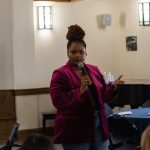In 2013, Colby College celebrated its bicentennial. The occasion was celebrated with a myriad of events, but specifically included an oral history project with alumni (stretching back to those who graduated in 1940), an hour-long documentary, and a multimedia website that highlighted alumni, notable faculty and staff, and a timeline of major events of the past two hundred years.
Judging from information found on Colby’s website, this extensive project began in 2008—suggesting that Colby committed to this work at least five years earlier. Colby’s dedication to its history and alumni is apparent. For example, Colby’s Dean of the College and Vice President of Advancement are both alumni. In addition to Colby College, other NESCAC institutions have celebrated their own bicentennials in equally extensive ways. As previously mentioned in a Tripod article on Trinity’s plans for a bicentennial celebration, Amherst College has developed an entire webpage devoted to this landmark event. The website is complete with a “Bicentennial Corner,” a photo gallery features comparison pictures of the college in the past and today, along with a section for games, quizzes, and projects. Amherst has also commissioned three keepsake books all written by alumni of the college.
Trinity will celebrate its bicentennial in less than two years—commemorating the institution’s founding in 1823. Though editorials in the Tripod have previously discussed Trinity’s commitment to its own fast-approaching bicentennial, it is also important to examine what Trinity plans to highlight in the history of the College. It will be a lofty task to measure up to what Colby produced in 2013 in less than two years at Trinity.
Of course, the COVID-19 pandemic has thrown a significant wrench in any progress Trinity—or any institution—could have achieved in recent times. Additionally, there already exists a multitude of resources via the Watkinson Library that detail Trinity’s extensive history in Hartford and in the world. Though not necessarily yet tied to a bicentennial project, plenty exists already to assemble a formidable celebration of two hundred years of Trinity.
In a recent edition of the paper, Director of Media Relations Stacy Sneed commented that currently it is, “too early in the planning process to talk about specific publications or commemorations.” Based on Colby College presumably beginning its own history project five years in advance, it is not too early to begin thinking about creating a documentary or publication or interactive website in celebration of Trinity.
Sneed cited to the Primus Project as an example of ongoing historical work at Trinity. This is a crucial first step in understanding the College’s long and varied relationship with issues of race in America. The Primus Project is importantly related to Trinity’s association with Universities Studying Slavery (USS), though its own website states that research is only in its “preliminary stages.” The website “Trinity and Slavery,” connected with the American Studies first offered in spring 2019, is explained as the first iteration of the work Trinity hopes to achieve—however some student research is clearly marked by the College as containing “some errors of fact” on the website itself.
The Primus Project is but one element of researching and recognizing Trinity’s history, including the parts that are not to be celebrated. For all the public is aware of, however, it seems to be just that—a start. There is much to our varied institutional history and at a time like our Bicentennial, all of it should be celebrated and recognized. The Trinity community is met with the difficult task of creating a fuller picture of the College’s history—and if it would like to be completed in time for 2023—it also must be accomplished under a time crunch.
The College must seriously commit financially to scholarly, fact-checked research and writing from students, faculty, emeritus faculty, alumni, and other members of the Trinity community in recognition of the bicentennial. This is not a project that should be outsourced—it can and should be accomplished by those associated with the College.
–The Trinity Tripod



+ There are no comments
Add yours